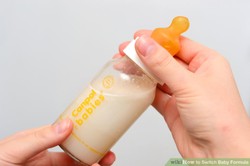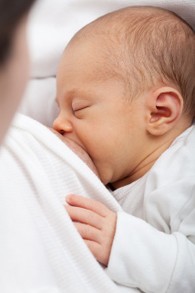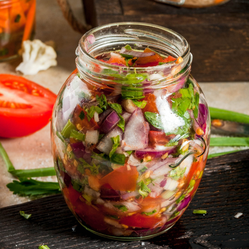Healthy infants, even those living in hot climates, do not need any water in addition to breastfeeding or formula. If you give as little as 1 cup (8 oz or 237 mL) water to an infant, He or she may develop hyponatremia (a drop of blood sodium levels). By giving even more water you can actually kill an infant. On the other hand, infants who have diarrhea or vomit profusely, need additional water. You should not give plain water to an infant with diarrhea but a special oral rehydration solution that contains electrolytes and sugar.

How much water does an infant need?
by greentree
A healthy infant can get all the water from beast milk or formula.
Infants and Dehydration
Infants need more water when they sweat excessively due to high fever or when they vomit repeatedly or have prolonged diarrhea. In these conditions, infants may get dehydrated quickly, much faster than older children or adults.
In order to prevent dehydration, infants need to drink additional fluid besides their regular food. They should never drink plain water, tea, fruit juice or soft drinks but only rehydration solutions with specific amounts of electrolytes and sugar. Pre-prepared "oral rehydration solutions" (ORS) of various brands with slightly different amounts of sodium, potassium and glucose are available in drug stores and bigger markets without prescription.
When you do not have an oral rehydration solutions available, you can quickly prepare one at home [2]. Put one liter of water in a pot and add 1/2 teaspoon of salt (3 grams of sodium chloride) and six level teaspoons of table sugar (about 25 grams of sucrose), mix well, boil and cool down to drinking temperature.
Small differences in the salt and sugar amounts should not be harmful, but using, for example, twice too little or too much of each ingredient can be dangerous. If you are not confident about measuring, ask someone for help.
Do not wait for a baby to get dehydrated but start giving the solution right after the onset of vomiting or diarrhea. Offer the solution by a spoon rather than a bottle, because a baby can suck too much solution from a bottle at once and then vomit it. Try to give one teaspoon of a solution every minute or so. Continue to give a solution even if a baby vomits repeatedly. If a baby refuses to drink or if you feel that he or she loses more fluid than you can provide it, take him or hem to a doctor as soon as possible.
Symptoms of dehydration in an infant [2]:
- Dry lips and mouth
- Sunken eyes
- Depressed fontanel (the soft spot on the top of the head)
- More than six hours without a wet diaper, dark urine
- Unusual sleepiness
You can also check the infant's skin turgor. You pinch the skin on his or her abdomen and release it; the skin fold that needs more than a second to flatten speaks for dehydration.
NOTE: Dehydration due to prolonged diarrhea from a simple Rotavirus infection (gastroenteritis, stomach flu) can be life threatening if not treated by rehydration promptly. According to World Health Organization (WHO), about 760,000 children under age of five die each year from diarrhea.
 | TRIORAL - Oral Rehydration Salts ORS (15, One Liter Packets/Box) World Health Organization (WHO) ... WHO Approved Reduced Osmolarity Oral Rehydration Salts 20.5g/0.72 oz Powder Packet. (NEW FORMULA). Manufactured according to Pharmaceutical Good Manufacturing Practices (GMP). T... |
Infants and Water Intoxication
Water intoxication means a drop of blood sodium levels due to excessive intake of plain water, tea or fruit juice, which contain only a little sodium. As little as one cup (237 mL) of water, in addition to breastfeeding or formula, can cause water intoxication in an infant younger than 6 months. Symptoms include excessive urination (>6-8 wet diapers a day), swelling around the eyes, irritability, vomiting and seizures.
Example: A newborn girl was fed by 2 oz of milk formula and 4 oz of water every 4 hours; she developed hyponatremia with seizures and she lost consciousness. Luckily, she was successfully treated with no complications.
NOTE: Do not give plain water to an infant and do not dilute formula from any reason.
Gripe water is usually used in small amounts, so it should not be dangerous as such, but there is insufficient evidence about its effectiveness in treatment of abdominal colic.
References:
- Myths and facts about breastfeeding State of New Jersey, Department of Health
- Oral rehydration solutions, made at home Rehydration Project
- Dehydration in infants and toddlers eHealthStar
Thumbnail image source: Wikihow (Creative Commons licence)
You might also like
Why Eat Fermented Foods?The health benefits of eating fermented foods are numerous and fermenting you...
Foods That Help Kids Learn BetterThere are many simple things anyone can do to speed up the learning process m...
School Breakfast and LunchNutritious school meals have an important role each day for students.




 Fructose Malabsorptionon 03/19/2016
Fructose Malabsorptionon 03/19/2016
 Scientific Facts About Sugars and Other Sweetenerson 03/17/2016
Scientific Facts About Sugars and Other Sweetenerson 03/17/2016
 Headache on the Back of the Headon 03/11/2016
Headache on the Back of the Headon 03/11/2016
 Alcohol-Related Headacheon 03/09/2016
Alcohol-Related Headacheon 03/09/2016




Comments
Important information, most of us do not think about a baby getting dehydrated until it happens.